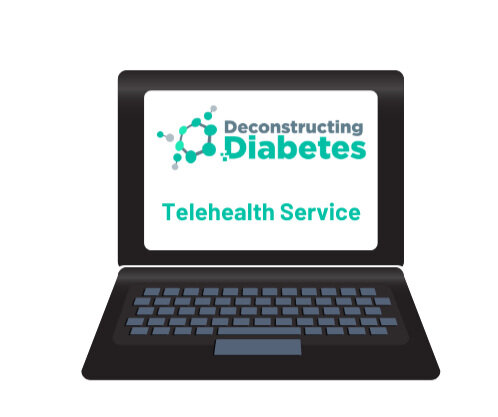Managing the Festive Season with Diabetes
Managing the festive season can be difficult for some people to manage. Our team have put together a few tips to help you out at this time.

Simplify Eating with Diabetes
Simplifying what to eat with diabetes.
Nutrition Consulting. Telehealth. Resources. Blog.
Cam Johnson
Specialist Diabetes Dietitian (APD)
Melbourne, Australia

Managing the festive season can be difficult for some people to manage. Our team have put together a few tips to help you out at this time.







No Drink November is a month of abstaining from alcohol. A month of reducing alcohol, such as during November can increase your awareness, address intake, and reflect if this is a habit or routine.
Read More
Covid 19 has accelerated the use of digital technology for healthcare in Australia.
At the start of the pandemic, policy measures were initiated to support health system capacity, protect patients and health care providers from exposure to infection risk , and maintain healthcare.
Diabetes management via telehealth had been on the horizon for a number of years, mostly used in regional areas. Diabetes management consultations include the review of glucose data, and the remote monitoring of glucose and provision of education, and support.
The pandemic forced health care into a new paradigm, and enabled clients a revised way of being supported. It has been stated that a decade of work was made in a week.
This has created benefits and opportunities for access, support and care for clients.
Telehealth includes phone and video – consultations via a secure, encrypted platform. This technology enables screen sharing, and the provision of education and support materials.
Clients can be seen in the comfort and privacy of their home or office. Travel time to get to clinics, factors including child care, time off work, waiting times, etc are no longer a barrier. Appointments can be scheduled during lunch breaks, after hours and on weekends, with less disruption to the day.
Deconstructing Diabetes clients have jumped at this possibility, and because commuting is not a limitation, our service is also seeing rural and interstate clients. Our referrer network has expanded far beyond the local area we were previously servicing.
This service has also enabled more regular support, and we have experienced less cancellations and appointment rescheduling.
Clients are more engaged in their own management. Our service has online pre initial and review consultation questionnaires for lifestyle, habits, dietary behaviour and goals. We have found clients to come to their appointments better prepared, having reflected on their dietary intake and diabetes management.
Telehealth enables a dietitian insights into what’s in a clients kitchen, review shopping lists, food products, etc. This enhances the consultation by better tailoring to the clients real world situation.
Family members and support persons also find it easier to be involved in the consultation.
In the last 2 months I’ve presented at the Australian Diabetes in Pregnancy Society (ADIPS) and also the Australasian Diabetes Congress (ADS / ADEA) on the theme of Telehealth and nutritional management of diabetes. Topics covered were the benefits, challenges, tech set up, administrative and practical aspects of changing from bricks and mortar clinics to online.
The experience of using telehealth for the last 1.5 years has expanded the scope of traditional model of nutrition consultations, and enabled new possibilities for using digital health, improving products and services in the future.
We are working on some very exciting projects in the digital space which will further enhance the diabetes management for our clients!
Watch this space for some announcements soon!
EOFY is End of Financial Year and we are also proposing an End of Fad Diets and Yo-Yo Dieting.

EOFY. End Of Financial Year and End of Fad Diets and Yo-Yo Dieting.
At tax time we gather our income and expenditures, level our checks and balances over the year, make an appointment with the accountant and submit to the tax department.
For some, these numbers come as a surprise, with little thought going into squaring books in the previous 12 months.
Somewhat like New Year’s Eve. A time of reflection on goals from 1 year ago, with little thought into the previous 12 months. Some of these goals may have been health related.
So, if an extreme dietary regime / unsustainable program or weight loss followed by weight regain has been on your list of checks and balances this year, maybe this is a good time to revisit your approach.
This is a good time to take an inventory of what’s working, what’s able to be sustained in the long term, what barriers are in the way.
EOFY is about focusing on healthy eating and exercise behaviours, meal planning, organisation, having a program which controls hunger, is nutritious and is sustainable.
This compares to short term, restrictive eating, weight loss and subsequent weight gain.
Like visiting your accountant to stay accountable, a dietitian specialising in healthy eating habits helps to keep you avoiding fad diets and yo yo dieting, and keeps you accountable through the year, not just at EOFY.
Are you looking for ways include exercise to help your diabetes control? Expert advice for getting started and staying on track with exercise? 3 Exercise Specialists provide their tips for how to include exercise to help with controlling diabetes.
Read MoreDid you want to know how to manage Ramadan with diabetes? We've written a guide to assist you with glucose checking, healthy diet and food choices during Ramadan
Read MoreJanuary 1st is started with best intentions to make significant changes and New Years Resolutions.
You might have said “Really, this year, this is the year I’m really going to do it”.
And by February, as many as 80 % of plans have fallen by the wayside.
We get busy and can go back to previous habits and routines.
What can you do to make this year different?

Tiny Goals
Sometimes we think we need to do something monumental with our dietary intake to make a measurable health improvement.
However maybe you only need to do something that may seem trivial, that doesn’t take too much energy, willpower, or sacrifice and do it consistently for the whole year.
- Set Behavioural Goals
- 15 minute walking before starting work for the day
- Ensuring you have a vegetable (yes just one – and no, not potato for every meal)
- Preparing a meal plan for the day , or the week, and creating a shopping list
- Taking lunch to work 4 days per week
- Focus on positive behaviour – ie “I’m going to start to do [insert new habit]” rather than avoiding a negative behaviour ie “I’m going to stop doing [insert stopping old habit]”
- Having long term outcome goals are great, but the daily behaviours are what is going to get you to reach those outcome goals
Avoid Extreme Rules and Dietary Restriction
- Extreme restrictions and fad diets (dietary dogma) are difficult to follow from a psychological, social and physiological perspective
- Examples are avoiding all carbs, keto, carnivore diet. They may work for some people, but for the majority of people the long term results (1-2 years plus) are not great.
- If intermittent fasting works for you, that’s amazing, but if it means you eat a plate full of snacks later in the day, it’s really not going to work in the long term.
- Restrictions may lead to feelings of failure, guilt, binges, disordered eating, weight cycling
Check Ins, Being Accountable
Rather than wait until January 1st next year to evaluate what’s worked, and what hasn’t this year, regular monitoring can keep you on track, and adjust plans as needed.
Some strategies our clients do are:
- Hunger rating scale
- Checklists to help – shopping lists, number of meals, food group intake
- Food diary to relate glucose levels, patterns of intake, where meals are eaten
- Clothes size, or weight changes
- Timely dietitian reviews and coaching. Making ongoing lifestyle choices can be a bumpy ride, and you don’t have to do it alone
Flexibility with Plans
If 2020 taught us anything, plans can be difficult. Events will come up, situations will change (returning to the office), holiday plans may be altered. The same with our dietary intake, we may need to adapt to changing situations.
Consistency
It’s not what you do all the time, it’s what you do most of the time.
Rather than thinking about the perfect diet and the perfect exercise program, it’s somewhat refreshing for my clients to have a “reasonable diet and reasonable exercise approach”.
This means:
- Following some guidelines for good nutritional intake that meets nutritional requirements, fuels exercise, prevents you from being hungry
- Having meals rather than snacks
- Having balanced meals which contain high fibre, some protein, an amount of carbohydrate that fuels exercise, and good fats. The right program can me maintained and doesn’t result in feeling deprived
- Eating mindfully / consciously
Remember the best nutritional plan needs to be sustainable all year, not just the first month of the year.
Many people with diabetes have questions about how to navigate the festive period.
With food choices, events and situations that influence weight management and diabetes control, this time of the year can provide some challenges.
We’ve put together 2 infographics that may assist at this time. The 1st is for people with diabetes, and the 2nd is a guide for friends and family to assist those with diabetes.
Stay Safe and Have a Great Festive Season!

A Guide for People with Diabetes and Surviving the Festive Season.
If you are a carer or providing support for a friend of family member with diabetes, the following ideas may help during the Festive Season.

Helping Friends and Family with Diabetes During the Festive Season.
Did you gain weight during the lockdown? We've written a guide. to assist you with lifestyle choices, healthy diet and food choices to manage your weight during Covid-19
Read MoreWorking from home and looking for snacks that are weight and diabetes friendly. Here’s a list of 19 snack options to choose during Covid-19
Read More